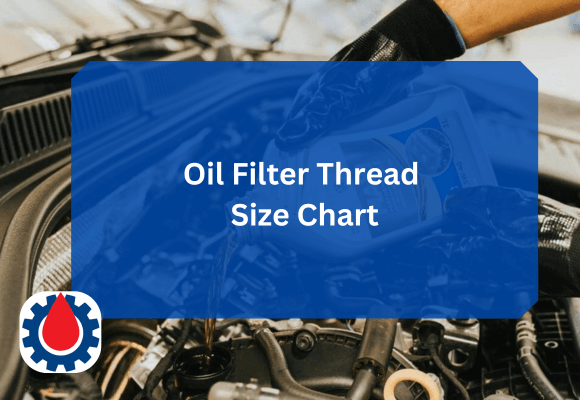When replacing your vehicle’s oil filter, knowing the thread size is just as crucial as knowing the part number. The thread size determines how the filter fits onto the engine’s oil filter mount, a mismatch can lead to oil leaks or even engine damage.
This guide provides a comprehensive oil filter thread size chart for different makes and models, helping you find the right fit easily.
Oil Filter Thread Size Chart
| Thread Size | Thread Pitch | Filter Example (Common Code) | Typical Application | Vehicle Examples |
|---|---|---|---|---|
| M20 x 1.5 | 1.5 mm | Bosch 3330 / Fram PH3614 | Most Japanese & Korean cars | Toyota Corolla, Nissan Sentra, Honda Accord, Hyundai Sonata |
| M18 x 1.5 | 1.5 mm | Fram PH7317 / Wix 51356 | Compact vehicles & motorcycles | Honda Civic, Kawasaki Ninja, Yamaha YZF |
| 3/4″-16 UNF | – | Fram PH8A / Motorcraft FL1A | American vehicles & trucks | Ford F-150, Dodge Ram 1500, Jeep Wrangler |
| 13/16″-16 UNF | – | Fram PH43 / AC Delco PF2 | GM & Chrysler vehicles | Chevy Silverado, Dodge Durango, Buick Regal |
| M22 x 1.5 | 1.5 mm | Mann W940/29 | Heavy-duty diesel engines | Mercedes-Benz Actros, Volvo VNL |
| M27 x 1.5 | 1.5 mm | Baldwin B7039 | Industrial & marine applications | Caterpillar 3208, John Deere Marine |
| M26 x 1.5 | 1.5 mm | Mahle OC 593 | Diesel engines | Isuzu NPR, Mitsubishi Fuso Canter |
| 7/8″-14 UNF | – | Wix 51515 | High-performance vehicles | Ford Mustang GT, Chevy Camaro SS |
| M30 x 1.5 | 1.5 mm | Mann W950/4 | Heavy-duty commercial trucks | MAN TGX, Scania R-Series, DAF XF |
| M24 x 1.5 | 1.5 mm | Fleetguard LF777 | Construction & agricultural engines | Kubota M7040, Case IH Maxxum, CAT 312 |
| 1″-12 UNF | – | Baldwin B164 | Off-road & equipment engines | John Deere 4045, Cummins 6BT, Detroit Diesel |
| M12 x 1.25 | 1.25 mm | K&N KN-204 | Small engines & motorcycles | Honda CRF450, Suzuki GSXR750 |
| M16 x 1.5 | 1.5 mm | Bosch 3323 / Fram PH3387A | Passenger cars | Chevy Cruze, Opel Astra, VW Golf |
| 9/16″-18 UNF | – | Wix 51348 | Small capacity filters | Polaris RZR, Yamaha Grizzly, Honda TRX |
| M32 x 1.5 | 1.5 mm | Mann W962/14 | Industrial diesel engines | Perkins 1104, Cummins ISX15 |
| M14 x 1.5 | 1.5 mm | Bosch 0986 / Fram PH6607 | Small passenger cars & scooters | Fiat 500, Vespa GTS, Mini Cooper |
| 1-1/8″-16 UNF | – | Wix 51791 | Heavy-duty trucks & buses | Freightliner Cascadia, International ProStar |
| M36 x 1.5 | 1.5 mm | Fleetguard LF9080 | Large industrial diesel engines | Cummins QSX, Komatsu PC200 |
| M28 x 1.5 | 1.5 mm | Mahle OC 617 | European diesel vehicles | BMW X5 Diesel, Audi Q7 TDI |
| 5/8″-18 UNF | – | Fram PH16 / Wix 51334 | Older American vehicles & small engines | Chevy Nova (60s-70s), Briggs & Stratton |
| M68 x 2.0 | 2.0 mm | Baldwin B7299 | Heavy-duty marine & industrial applications | Caterpillar C15, Volvo Penta |
| M23 x 1.5 | 1.5 mm | Mann W930/21 | Agricultural & compact diesel engines | New Holland T5, Massey Ferguson 4700 |
| M33 x 2.0 | 2.0 mm | Fleetguard LF3970 | Heavy-duty construction equipment | Hitachi ZX200, JCB JS220 |
Related Best Engine Oil Filter(Top 7 BEST 2025)
Understanding Oil Filter Thread Sizes
Oil filters come in various thread sizes and pitch measurements. The thread size refers to the diameter of the screw-on fitting, while the thread pitch refers to the distance between threads. For example, an M20 x 1.5 thread means the thread diameter is 20 mm, and the pitch is 1.5 mm.
Common thread types include:
- Metric Threads (M) — e.g., M20 x 1.5, M18 x 1.5
- Inch Threads (UNF) — e.g., 3/4″-16, 13/16″-16
- Special Threads — used for specific engines or machinery
Related STP Oil Filter Fit Chart(Complete Guide)
How to Identify Your Oil Filter Thread Size
To ensure proper installation, you can determine your oil filter thread size in several ways:
- Check the Old Filter: Most filters have thread specs printed or engraved on them.
- Consult the Vehicle Manual: The manufacturer usually specifies compatible filters and thread types.
- Use a Thread Gauge: A thread gauge helps measure both diameter and pitch accurately.
- Cross-Reference Tools: Many oil filter manufacturers offer cross-reference charts online that list compatible thread sizes.
Why Thread Size Matters
The correct thread size ensures:
- Leak-Free Seal: Prevents oil leaks during engine operation.
- Proper Oil Pressure: Incorrect filters can restrict oil flow, affecting lubrication.
- Engine Longevity: The Right fit ensures optimal oil filtration and engine protection.
- Ease of Installation: Filters with matching threads are easier to screw in or remove.
Using the wrong thread size can lead to cross-threading, oil leaks, or even catastrophic engine failure.
Related Fram Cross Reference Oil Filter Chart(All Brands)
Common Mistakes When Matching Oil Filter Threads
- Assuming Size by Eye: Always measure; threads may appear similar but differ in pitch.
- Mixing Metric and UNF Threads: They may fit loosely or strip during tightening.
- Over-Tightening: Hand-tight plus ¾ turn is usually enough for most filters.
- Ignoring Gasket Compatibility: Even if threads match, the gasket diameter must also align.
Tips for Choosing the Right Oil Filter
When selecting a replacement filter:
- Match the thread size and gasket diameter exactly.
- Consider filter media type (synthetic, cellulose, or blended).
- Choose reputable brands like Fram, Bosch, Wix, Mann, Baldwin, or AC Delco.
- Replace the filter with every oil change for maximum protection.
Related Purolator Oil Filter Cross Reference Chart(For ALL Brands)
FAQs
What is the thread on a standard oil filter?
The most common thread size for standard automotive oil filters is M20 x 1.5 or 3/4″-16 UNF. These sizes are used on a wide range of cars, SUVs, and light trucks, including models from Toyota, Ford, Honda, and Nissan. However, thread sizes can vary depending on the make, model, and engine type, so always check your vehicle’s specifications before purchasing a new filter.
How to measure oil filter thread size?
To measure an oil filter’s thread size:
- Use a caliper to measure the outer diameter of the threaded fitting.
- Use a thread pitch gauge to determine the distance between threads (pitch).
- Identify whether it’s a metric (M) thread (measured in millimeters) or a UNF (inch-based) thread.
- For example, an M20 x 1.5 means 20 mm diameter and 1.5 mm pitch, while 3/4″-16 means ¾-inch diameter and 16 threads per inch.
What size is a standard oil filter?
A “standard” oil filter size typically refers to both thread size and filter body dimensions. For most passenger vehicles, the standard thread is M20 x 1.5 or 3/4″-16, with a filter diameter around 2.5–3 inches and a height of 3–4 inches. However, high-performance and heavy-duty engines often use larger threads like M22 x 1.5 or 1″-12 UNF.
Related Kawasaki 49065 Oil Filter Cross Reference Chart(All Brands)
What size is a filter thread?
Oil filter threads come in both metric and inch-based measurements. The most common sizes include:
- M20 x 1.5 (used on Toyota, Honda, Nissan, Hyundai)
- 3/4″-16 UNF (used on Ford, Dodge, Jeep, and GM)
- M18 x 1.5 (used on smaller vehicles and motorcycles)
- 13/16″-16 UNF (used on older GM and Chrysler models)
- Each filter thread must match the engine mount to ensure a tight, leak-free seal.
Are all oil filters threaded the same?
No, oil filters are not all threaded the same. Different engines require specific thread diameters and pitches. For instance, a Toyota Corolla’s filter uses M20 x 1.5, while a Chevy Silverado may use 13/16″-16. Mixing filters with incompatible threads can cause leaks, pressure loss, or filter blowout. Always match the thread size and gasket diameter before installation.
What size thread is a 51042 oil filter?
The Fram 51042 oil filter (and its equivalents) uses an M20 x 1.5 thread size. It fits many Honda, Nissan, Mazda, and Subaru engines. The filter’s compact design makes it suitable for smaller displacement engines while maintaining proper oil flow and filtration performance.
Final Thoughts
Choosing the right oil filter thread size is essential for maintaining your engine’s performance and longevity. Always verify your vehicle’s thread size before purchasing a new filter.
A properly fitted oil filter guarantees effective oil flow, filtration efficiency, and leak-free operation, keeping your engine clean and running smoothly for years.




